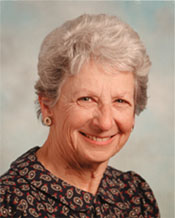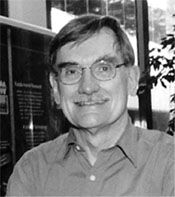APS Committees Acting Globally
 Noemie Koller |
One in five APS members currently lives and works outside of the US; international collaborations are vital for large research efforts; and few things stimulate scientific progress more than the free flow of information across borders and cultures. These are just a few of the many reasons that the APS has interests in events and conditions in the world beyond American shores. In fact, two of the standing APS committees are specifically dedicated to monitoring and influencing international affairs.
The Committee on the International Freedom of Scientists (CIFS) began as a subcommittee under the APS Panel On Public Affairs (POPA) in the 1970s, and blossomed into a full-fledged APS committee in the 1980s. The Committee on International Scientific Affairs (CISA) followed a similar progression in the 1980s and early 1990s. The cold war era that set the stage for the creation of the committees in the first place is rapidly fading into history. Nevertheless, the injustices that motivate CIFS and the issues that trouble CISA remain as serious today as they were a quarter century ago.
CIFS: Working for Freedom
Even in the era of enlightened globalization, free speech is still a crime in many countries. Peaceful assembly and other fundamental liberties are restricted in some corners, and unheard of in others. Because scientists are often at the forefront of the struggle for basic rights, they are disproportionally represented among those imprisoned for crimes of conscience. In addition, scientists are crucial to technological military projects, and the simple access to sensitive information is sometimes enough to draw fire from overzealous spy hunters, even in countries as enlightened as the US.
CIFS is the APS committee responsible for monitoring concerns regarding human rights of scientists throughout the world. In addition to informing the APS president, Executive Board, and Council about rights violations, the committee writes letters on behalf of imprisoned or persecuted scientists. Recently, CIFS added its name to a list of sponsors on a petition to authorities of the People's Republic of China requesting fair treatment for eight prisoners, two of whom are physicists.
"The most important role of CIFS," explains committee chair Noemie Koller, "is to help people who have not been lucky enough to live under free conditions. And part of the motivation is, of course, that science is wonderful, and we want everybody to be able carry it on freely - to follow their imaginations and creativity. It's a universal concept, independent of where in the world it's done."
Such lofty goals require patience and persistence. "We are dealing with closed regimes, with regimes where laws change as you go along: as soon as you get past one hurdle, laws change and you start all over again," Koller explains. "It takes a long time for each individual before we get them out of jail or out of trouble. We've achieved some success in several cases, but it has been slow."
Ironically, one of the difficulties that CIFS has faced in recent years resulted from the fall of the Soviet Union. During the cold war, imperilled Soviet dissidents included physicists Andrei Sakharov and Natan Sharansky, and biologist Yuri Orlov. While countless lesser-known dissidents suffered as well, the big three achieved enough notoriety that a group of activists in the US joined the struggle against Soviet repression under the moniker "Scientists for Sakharov, Orlov, and Sharansky," or SOS for short. It's likely that few people these days recognize the names Yury Bandazhevsky, Tong Shidong, or Valentin Danilov - three physicists included on the CIFS list of current cases. Raising awareness for comparatively anonymous individuals is a significant challenge.
In light of the events of the past year, CIFS must adjust again. "We are entering new territory," says Koller, "September 11 changed the parameters." Sessions at APS meetings, which once served as the primary vehicles for dissemination of CIFS information, are drawing fewer participants. The committee is considering using newsletters to take up the slack in communication. Another issue of increasing importance is communication with scientists in Islamic communities. Koller points out that CIFS has well developed relations with countries such as Russia, China, and Belarus, but little experience with the Near East. "We have to increase our awareness of the scientific climate and opportunities in Near Eastern countries and open channels of communication."
Koller is not entirely certain what vehicles CIFS will employ in their future efforts, considering the volatility of the moment, but her vision of the committee's ultimate purpose is clear. "Our major goal," asserts Koller, "is to monitor and uphold the human rights of scientists throughout the world."
CISA: Advancing Physics Education, Research, and Community
CISA's role, as defined in the APS bylaws, consists of "encouraging the society's efforts to strengthen interaction among researchers and institutions in different regions of the world and to further extend worldwide access of physicists to scientific information and its exchange." To these ends, CISA promotes the free flow of information and scientific personnel across borders, and strives to bolster science programs and funding in underdeveloped countries.
 Peter Barnes |
Current CISA chair Peter Barnes feels that physics education and research, in both developing and established countries, are among the committee's primary concerns. Coordinating interactions that cement the physics community worldwide is also an important committee function. A recent focus, which is somewhat nebulous at the moment, involves helping find solutions to technically sophisticated applied physics problems that plague underprivileged nations.
"Under the category of education," says Barnes, "we promote physics in underdeveloped countries. Getting copies of the Physical Review, for example, into libraries or physics departments in Africa or Latin America is one educational avenue that we pursue."
Barnes breaks down the research effort into two categories. One thrust involves helping physicists involved in research in developed countries. "We have an important segment of the APS that works in research labs such as CERN and DESY, and labs in Japan, to name a few." Another CISA effort concentrates on promoting sophisticated research programs in less developed regions. "For example, we were recently discussing the established plans for construction of a light source (SESAME) in Jordan."
CISA is also instrumental in promoting development of the physics community as a whole. "That means orchestrating physics conferences between the American Physical Society and, say Canadian and Mexican societies," Barnes explains, "This is useful both from the point of view of discussing physics research as well as tying the communities together."
Finally, the committee is contemplating a request to become involved in a rather different issue. There is a need for expertise to help find ways to detect and clear land mines in countries such as Croatia, where the request for help originated, as well as Southeast Asia and many other regions. "It's going to be a problem in Afghanistan," says Barnes. "This is a well known applied physics problem of international proportions, which requires development of sophisticated and highly reliable technical solution." Barnes speculates that APS role, if it has one in this case, is to motivate the investment of US technical expertise in this very difficult area. [See the BackPage in this issue.]
Facing a World in Flux
Koller and Barnes both express some concern over the roles of their committees in coming years. After all, the world's current political and social volatility presents at least as much challenge to CISA and CIFS as did the precarious balances of the cold war era. However they approach their respective tasks, the chairs are both hopeful that the committees will continue to effectively reflect the growing international flavor of the APS. Ironically, one of the positive outcomes of these troubled times is likely to be increased contact, and potentially improved relations, with Islamic nations that have long been under-represented in the global physics community.
—James Riordon
©1995 - 2024, AMERICAN PHYSICAL SOCIETY
APS encourages the redistribution of the materials included in this newspaper provided that attribution to the source is noted and the materials are not truncated or changed.
Associate Editor: Jennifer Ouellette
July 2002 (Volume 11, Number 7)
Articles in this Issue

